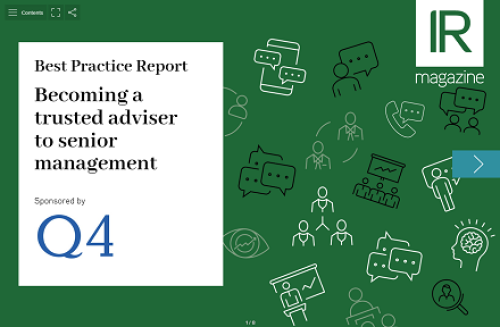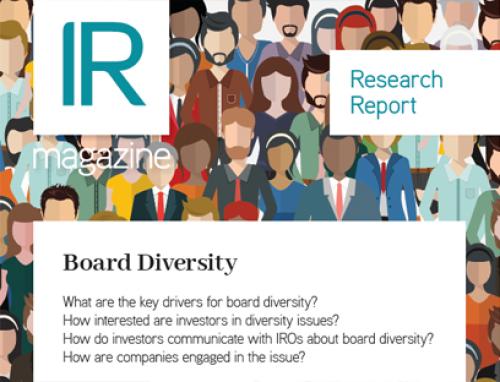Interviews with the winners at the IR Magazine Europe Awards 2010
This year’s IR Magazine Europe Awards honored the best IR practitioners across Europe. Around 400 people from 19 different countries attended the gala event at the Hilton Hotel on Park Lane in London.
RWE
After spending 10 years as head of IR at German power company RWE, Ingo Alphéus was awarded best IRO at a large cap at the IR Magazine Europe Awards 2010. He has now left investor relations to become RWE’s chairman of the management board.
Are you going to miss that contact with the investors?
I’m sure I’ll stay in touch with some of the old contacts from my IR role but I’m already missing the day-to-day contact. I have a different audience right now – real customers and politicians for instance, so it’s a completely new target group in the utility universe. But that’s exactly what I was looking for: a new challenge.
Obviously you leave a bit of a legacy for your colleagues. What’s your advice for other people looking to develop a successful IR team?
The most important point is to have a great team and spend a lot of time developing it, choosing the right people and letting them act independently. Don’t try to be number one all the time. My successors were ready to take over as soon as I left, which is what I was hoping for.
What investors and analysts said about Ingo Alpheus
‘Info Alpheus, the IRO at RWE, deserves to be nominated and to win the award. This is his final year in the job and for 10 years he has been an excellent head of IR.’
‘Plain speaking from the IRO at RWE – and he is prepared to answer questions with a noted lack of avoidance.’
BASF
Magdalena Moll, head of IR at BASF, spoke to IR magazine after picking up the grand prix for best overall IR by a large cap at the IR Magazine Europe Awards 2010.
How do you measure your performance at BASF?
As a chemicals company, we are very performance-oriented and use various criteria to measure our investor relations activities. At the end of the year I sit down with my boss Jürgen Hambrecht [chairman of the board at BASF], who reviews our activities and then assesses our work.
Do you have a preference for quantitative or qualitative metrics?
It’s a combination of the two. Basically we look at the content of our communication and messaging. We also look at how we segment our investors and how many investors we see per year, as well as the more qualitative measures such as perception studies.
What’s it like managing IR with a big team?
We have 12 people in the team at present. As a company, we have 14 divisions and each division is as large as an MDAX company, so we have more than €50 bn in sales. Our task is to collect and gather lots of information from the various divisions so I have selected specialists for individual segments such as plastics or agriculture solutions or oil and gas, and they are very closely networked with people in the operations.
Do you have lots of analysts to deal with?
We have around 30 analysts who follow us so we split the task: we have five IROs who speak to analysts and they each handle between five and seven analysts. We try to work closely with analysts during our roadshows and we also meet them on a one-on-one basis, either for lunch or for dinner. Then you can have a more detailed or personal conversation.
What is your advice for other people wanting to win this award next year?
I’m very proud to win this award – it’s the third large award we’ve won this year. I think the success factors are threefold: first, we have a very good communications strategy in terms of defining which messages we have to communicate and how we communicate them to our various target groups. Second, I think we have a very comprehensive and innovative communication toolbox, ranging from capital market stories to fact books, the website and other innovative tools. We’re also tweeting now, which is really fascinating.
Third, I think it’s about having a diverse team. Our team members are from different countries within Europe and we now have a new team member joining us from Asia. We have chemists, physicists and business administration experts, with an approximately 50/50 male/female split.
What investors and analysts said about BASF
‘IR from BASF is big and bold: an informative annual report, excellent quarterly presentations, good teleconferences and a formidable IR team.’
‘Overall, BASF has the best IR because of its excellent IR team and the frequent presentations. Head of IR Magdalena Moll is tirelessly diligent – the results information is complete and the message consistent.’
Cpl
Josephine Tierney, finance director at recruitment firm Cpl, picked up the award for best IR by a company on a small-cap exchange.
Where are most of your investors located?
They’re a mix from Ireland, the UK and some in mainland Europe. It’s changing, it always changes depending on how the market evolves and how our cap size changes, but I think it’s a spread.
What’s the most important issue for finance directors who do investor relations?
Get to know your industry, know it well and be honest. It’s important to tell people about the negatives as well as the positives; you need to educate. It’s not all about trying to sell the story that people might not believe. I think belief is everything.
How much time do you spend actually dealing with the investors?
It depends. We try to be as available as investors want. I’ve come to know a lot of the guys so I encourage them to call me directly if they need to talk. I want them to always feel there’s an open-door policy. I hate the idea of them wondering and worrying so whenever they need to ask us questions, we encourage them to talk to us. It really depends on what’s happening in the industry.
What investors and analysts said about Cpl
‘The website is useful and the all-round communications are good. With CEO Anne Heraty at the helm, the messages from Cpl are always clear.’
A full list of the winners can be viewed here.










